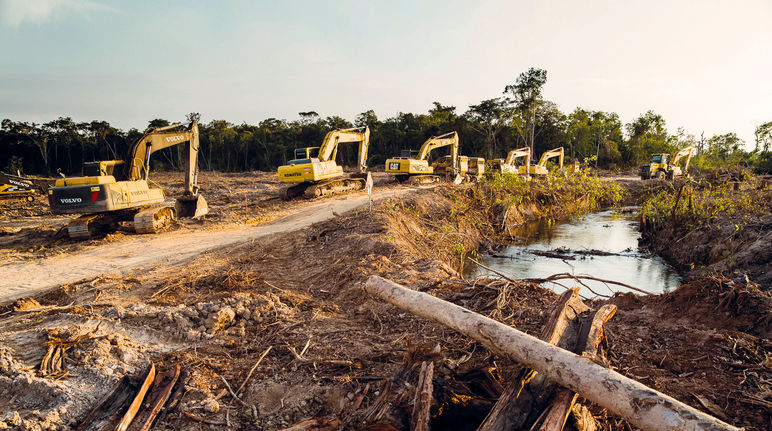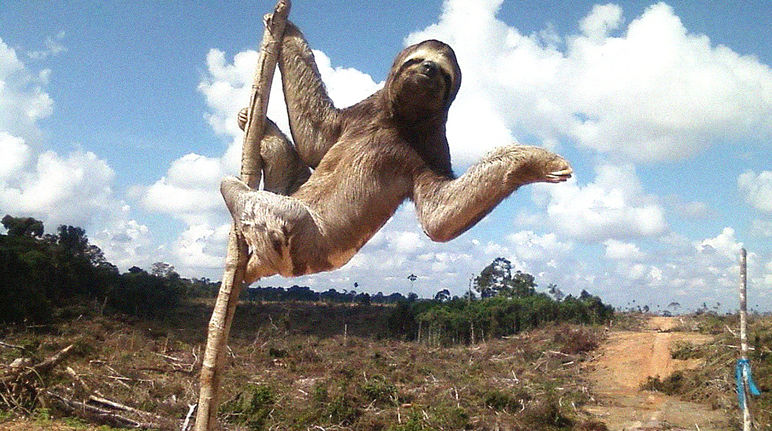Keep loggers and the palm oil industry out of the Peruvian Amazon!
No permit was ever issued for the road that already reaches deep into the rainforest of Ucayali. Heavy machinery is flattening the vegetation to build a gateway for loggers and palm oil companies. 100,000 hectares of rainforest are in danger. Please tell the Peruvian authorities to put a stop to the construction work.
Call to actionTo: the Government, Congress and Judiciary of the Republic of Peru
“Stop the construction of an illegal road for loggers and palm oil companies in the Peruvian Amazon. Prevent the destruction of 100,000 hectares of rainforest!”
Bulldozers tear open a gash of red soil, which runs like a trail of blood through the jungle of Ucayali. Heavy construction machinery is hauling in, spreading and compacting sand and gravel dredged from nearby rivers. This is the foundation for a new road into the Amazon rainforest – a gateway for loggers and the palm oil industry.
While the equipment was provided by local authorities, no permit was ever issued for the road’s construction, notes Kene, a Peruvian environmental NGO.
While giant trees still reach for the sky along the edge of the clearing, this marks the beginning of the end for the rainforest: loggers will soon be using the road to take out precious tropical timber while illegal settlers, land speculators and palm oil companies crowd in and grab land.
Workers, machines, oil palm seedlings, fertilizers and pesticides will be trucked into the previously inaccessible rainforest. The route connects two huge clearings for oil palm plantations being realized for foreign investors, as the Peruvian media and studies by environmental organizations have documented.
Satellite imagery shows that at least 12,000 hectares of rainforest have been cleared and planted with oil palms since 2011.
The world’s most biodiverse ecosystem is being destroyed for a bleak palm oil monoculture. Violent land conflicts are a further consequence: six smallholders were murdered in early September 2017.
According to the indigenous Shipibo people of the Santa Clara de Ushunya community, the new road threatens more than 100,000 hectares of old-growth forest that they have preserved with their traditional way of life.
Please sign our petition – we need to send a loud and clear signal to the Peruvian government that this cannot go on.
BackgroundThe road is being built approximately 50 kilometers northwest of the city of Pucallpa in the department of Ucayali in the Peruvian Amazon. Local inhabitants and Kene, a Peruvian environmental organization, have documented its construction.
The road, which is located to the north of the Aguaytía and west of the Ucayali river, links two vast swathes of land cleared by the palm oil companies Ocho Sur U (formerly Plantaciones de Ucayali) and Ocho Sur P (formerly Plantaciones de Pucallpa).
Since 2011, palm oil companies have cleared at least 12,000 hectares of rainforest and planted the land with oil palms, according to satellite imagery and scientific evaluations.
Reports by the Peruvian Panamericana television network (in Spanish) about the activities of the two palm oil companies in Ucayali and the struggle of the indigenous people to preserve the rainforest and their livelihoods:
1. Ucayali: crimen ecológico en la selva peruana
2. Tala y quema en Ucayali: continúa la devastación de la selva peruana
To: the Government, Congress and Judiciary of the Republic of Peru
Mr. Pedro Pablo Kuczynski, President of Peru
Mr. Pablo Wilfredo Sánchez Velarde, National Prosecutor
Mr. Marco Antonio Arana Zegarra, Commission for Indigenous Peoples and the Environment, Congress of the Republic of Peru
Mr. Vicente Romero, Minister of the Interior
Ms. Elsa Galarza Contreras, Minister of the Environment
Mr. Bruno Giuffra Monteverde, Minister of Transport and Communications
Ladies and Gentlemen,
As citizens of the world, we are calling on you to stop the destruction of old-growth forests and the construction of illegal roads in the Bajo Rayal area, Nueva Requena district, Coronel Portillo province in Ucayali. The construction work and related activities threaten 100,000 hectares of rainforest.
The roads, which are intended to provide access for oil palm plantations, are leading to land speculation, contract killings, the wholesale destruction of old-growth forest, loss of biodiversity, soil and water pollution and other serious environmental impacts.
They also violate the human rights of indigenous peoples living in the Bajo Rayal area. Indigenous territories such as the village of Santa Clara de Ushunya are affected, as are the rights of all citizens of Peru. Palm oil companies and officials of the regional government of Ucayali are responsible for these negative impacts.
Yours faithfully,
The issue – rainforest on our dinner tables and in our fuel tanks
At 66 million tons annually, palm oil is the most commonly produced vegetable oil. Its low world market price and properties that lend themselves to processed foods have led the food industry to use it in half of all supermarket products. Palm oil can be found in frozen pizzas, biscuits and margarine, as well as body creams, soaps, makeup, candles and detergents.
Few people realize that almost half of the palm oil imported into the EU is used as biofuel. Since 2009, the mandatory blending of biofuels into motor vehicle fuels has been a major cause of deforestation.
Oil palm plantations currently cover more than 27 million hectares of the Earth’s surface. Forests and human settlements have been destroyed and replaced by “green deserts” containing virtually no biodiversity on an area the size of New Zealand.
The impact – suffering and death in producer countries, climate havoc
The warm, humid climate of the tropics offers perfect growth conditions for oil palms. Day after day, huge tracts of rainforest in Southeast Asia, Latin America and Africa are being bulldozed or torched to make room for more plantations, releasing vast amounts of carbon into the atmosphere. As a consequence, Indonesia – the world’s largest producer of palm oil – temporarily surpassed the United States in terms of greenhouse gas emissions in 2015. With their CO2 and methane emissions, palm oil-based biofuels actually have three times the climate impact of traditional fossil fuels.
Palm oil is not only bad for the climate: As their forest habitat is cleared, endangered species such as the orangutan, Borneo elephant and Sumatran tiger are being pushed closer to extinction. Smallholders and indigenous people who have inhabited and protected the forest for generations are often brutally driven from their land. In Indonesia, more than 700 land conflicts are related to the palm oil industry. Human rights violations are everyday occurrences, even on supposedly “sustainable” and “organic” plantations.
As consumers, we are largely unaware of these broader issues, yet our daily palm oil consumption also impacts our health: refined palm oil contains large amounts of harmful fatty acid esters that are known to damage DNA and cause cancer.
The solution – a revolution on our dinner tables and in our fuel tanks
Only 70,000 orangutans still roam the forests of Southeast Asia, yet the EU’s biofuels policy is pushing them to the brink of extinction. Every new plantation on Borneo is destroying a further piece of their habitat. Stepping up the pressure on policymakers is a must if we want to save our tree-dwelling kin. Apart from that, however, there is still a lot we can do in day-to-day life.
Follow these simple tips to recognize, avoid and combat palm oil:
- Enjoy a home-cooked meal: Use your imagination: why not try almond-coconut-pear biscuits? Or pizza with potato and rosemary? A meal cooked from fresh ingredients beats processed foods containing palm oil every time. Oils such as sunflower, olive, rapeseed or flaxseed are ideal for cooking and baking.
- Read labels: As of December 2014, labeling regulations in the EU require food products to clearly indicate that they contain palm oil. However, in the case of non-food items such as cosmetics and cleaning products, a wide range of chemical names may still be used to hide the use of palm oil. A quick check of your favorite search engine will turn up palm oil-free alternatives, however.
- Remember that the customer is king: Ask your retailers for palm oil-free products. Write product manufacturers and ask them why they aren’t using domestic oils. Companies can be quite sensitive to issues that give their products a bad name, so inquiring with sales staff and contacting manufacturers can make a real difference. Public pressure and increased awareness of the problem have already prompted some producers to stop using palm oil.
- Sign petitions and write your elected representatives: Online campaigns put pressure on policymakers responsible for biofuels and palm oil imports. Have you already signed all of Rainforest Rescue’s petitions?
- Speak out: Protest marches and creative action on the street raise public and media awareness of the issue, which in turn steps up the pressure on policymakers.
- Leave your car at home: Whenever you can, walk, ride a bicycle or use public transport.
- Be informed and inform others: Big Business and governments would like us to believe that biofuels are good for the climate and that oil palm plantations are sustainable. Spread the word – share this information with your family and friends and encourage them to rethink their consumption habits. It’s in our hands!
















 Recent successes
Recent successes